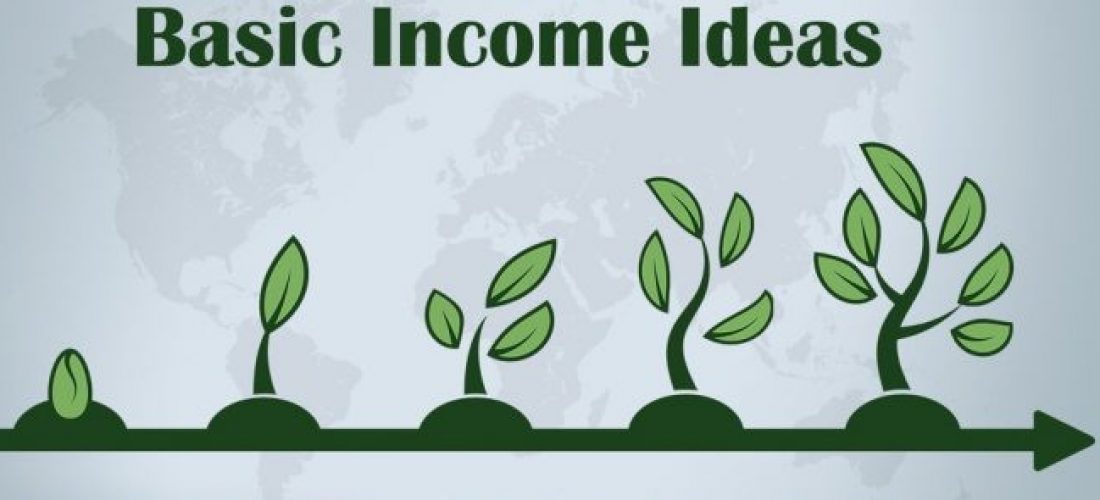Abstract
Is universal basic income (UBI) a policy idea whose time has come? Recent historical scholarship now enables us to comprehend the twentieth century evolution of this and similar ideas. UBI is intriguing in having vociferous backers drawn both from the libertarian right—such as, notably, Milton Friedman in the form of his negative income tax proposal—but also from the emancipation-embracing left—such as Michel Foucault and Phillipe Van Parijs. In this review, scepticism is expressed about whether UBI can seriously help to address issues of inequality, as opposed to preventing the poverty that liberal market economies tend insistently to generate.
To be fair, until the beginning of the 1980s, advocates of a guaranteed income for all were heirs to over half a century of contracting inequality, at least within most Western liberal advanced nations. This was, of course, in conformity with the Kuznets curve prediction first announced in 1955, and at the time considered by many (although not Kuznets himself) to have the status of an absolute law.6 This meant that a new, radical policy to promote human rights by abolishing absolute poverty everywhere as quickly as possible—’basic needs’ as it was termed in international development discourse—could be viewed as an unalloyed good, since inequality was apparently reducing over the longer term, anyway. It is certainly the case that in countries with masses of undocumented, unregistered poor, a policy which mandates governments to transfer at least some modest resources to each individual is valuable for the elementary recognition of their identity status as citizens, which the transfer requires, even if it does precious little to redress their structural inequality.7
However, by 1986, just as the international UBI movement of BIEN (Basic Income Earth Network) was being launched by Philippe Van Parijs and others, it was already evident that the Kuznets curve was turning in several leading liberal economies and also that the poor in debt-ridden countries were getting poorer. Mexico’s default in 1982 began a harsh decade for much of Latin America and the imposition of IMF structural adjustment loans and World Bank sectoral adjustment loans in health and education are now widely acknowledged to have been part of the problem, not the solution, for two wasted decades in sub-Saharan Africa.
Nevertheless those who came to endorse UBI included not only libertarian free-market thinkers, comfortable with inequality as a supposedly incentivising motor of market economies, but also various influential self-identifying left-wing, post-Marxist thinkers and politicians, including such major figures as Michel Foucault and André Gorz. If UBI does not address the fundamentals of economic inequality, why has it continued to receive support from many on the left during the last several decades, even in application to citizens in the richest countries? For example, Guy Standing, who championed basic incomes as adviser to the post-apartheid ANC leadership in South Africa from 1994.8 A recent adviser to Labour under Jeremy Corbyn’s leadership, Standing has again come out strongly in favour as a general post-Covid panacea.9
This has become even more puzzling since the publication in 2013 of Thomas Piketty’s epochal Capital in the Twenty-First Century. Immediately translated into English in 2014, Piketty has now made us all unavoidably aware that under a capitalist system of economic growth, contrary to the premature findings of the Kuznets curve, there is a persistent tendency for ‘r’, the growth of capital, to outrun ‘g’, the growth of the economy. The direct policy conclusion is that unless international finance capital is very fully taxed and very tightly regulated, inequality runs amok in a globalised, free trade, free market world—which corresponds to the observed reality of the last three decades.
Such restriction and regulation of the power and mobility of capital is exactly what had happened across the entire trans-war period, 1914–45, and also during the first three postwar decades, hence Kuznets’s finding in 1955 of declining inequality. But, with the demise of the Bretton Woods system, brought about in part by the world’s financiers, and subsequent political de-regulation in the world’s financial centres in the 1980s, accelerating inequality has been unleashed once again—as it had been during the century before 1914.10 In his 2020 sequel, Capital and Ideology, Piketty is now one of many researchers, along with Juliet Cagé, showing that the unfettered freedom of transnational finance capital poses an existential threat to democracy itself.11 This is through the capacities of corporations and the rich individuals who own them to monopolise, in their own narrow interests, both global and national information media and access to the ears of elected governments, while systematically avoiding paying taxes to the nations of ‘consumers’, from whom they draw their wealth flows.12 But even more seriously—if that wasn’t trouble enough—it is now becoming clear that these narrow interests of capitalist corporations to promote their own global growth in profits through mass consumerism, also pose an existential threat to the planet.
In light of all this, it is not possible to evaluate UBI’s prioritisation of reducing absolute poverty simply on its own terms and without putting it in the context of the larger problem of runaway global inequality. This is because UBI is a large and expensive policy of fiscal transfers. To back it as the right national policy to deal with absolute poverty directly entails the opportunity cost of not implementing quite a range of alternative resource-using policies, which cannot be afforded at the same time. If it can be argued that those alternative policies would not only redress absolute poverty, but would also decelerate inequality, then advocates of UBI, though motivated by good intentions towards the world’s poor, could in fact be viewed as unwitting handmaidens of the avaricious and of untaxed global capitalism’s dynamic of ever-increasing inequality, as identified by Piketty and others.
The 1970s crisis of confidence in the capacity of the Keynesian managed economy to provide paid employment for the bulk of its population was the context which encouraged several leading left-wing European thinkers and politicians to engage initially with the neoliberal policy of negative income tax that was first propounded by Milton Friedman, and subsequently with UBI. This followed on from what is described by Andrew Sanchez as ‘the cybernation frenzy’ that gripped influential futurologists like Robert Theobald in 1960s USA.13 The menace of intelligent machines ‘taking over’ also elicited an immediate imaginative response in British popular culture (one thinks of Dr Who’s Daleks in 1963 and the Cybermen in 1965). The left was already, since Hungary 1956 and Czechoslovakia 1968, disillusioned with what a communist state could do; and now it was beginning to doubt that the social democratic Keynesian welfare state had a future for worker-citizens, either.
In 1979 this led Michel Foucault, the left’s most mercurial intellectual, to turn Marxist ontology on its head (following his own well-documented, acid-induced head-turning trip in the California desert).14 Foucault now posited that humans’ social and psychological existence must be treated as quite distinct from their economic role—or lack of it—and so he became a proponent of Friedman’s NIT. This was already five years after Lionel Stoléru, as President Giscard d’Estaing’s Gaullist economic adviser in France, had argued, from rather different premises, that NIT would be the most pragmatic way to deal with deprivation while also preserving the efficiency of a competitive market economy, whereas policies to promote equality would simply end up with no market economy at all and everything directed by the state.15
Even André Gorz, one of the left’s most rigorous thinker at the time and a long-time opponent of unconditional basic income on Durkheimian grounds—that participation in paid work was the guarantor of an individual’s social and moral integration within society—eventually performed a volte-face on UBI in his celebrated 1997 book, Misères du présent, Richesse du possible. This followed from Gorz’s eventual acceptance that the future of human labour was going to be mainly post-Fordist, to be replaced by the application of immaterial intelligence and creativity to production processes—what Antonio Negri termed ‘cognitive capitalism’.16 For Gorz, only an unconditional and sufficient income could ensure that in contributing to such an economy, citizens preserved their own moral, cultural and political autonomy to develop themselves as they saw fit.
It can be—and it was—argued by the feminists of the US National Welfare Rights Organisation of 1966–75 that a ‘guaranteed income’ would provide an emancipatory wage for the unpaid caring work provided by so many women.17 A UBI also arguably increases—from a very low base—the bargaining power of the poorest casual and nonunionised workers, who are no longer absolutely compelled to work, provided they are comfortable to subsist on a UBI. Both of these aspects of a UBI do address specific aspects of the inequalities suffered by these two groups, but they do not fully address the structural dynamics of capitalism’s power to continue to promote inequality.
An increasingly exclusive intellectual focus of the New Left from the 1980s through to the 2000s on the conditions for the emancipated subjectivity of the individual provided common ground with the libertarian New Right.18 They identified their ‘common enemy [as]: the state’.19 This meant leading figures and intellectuals on the left took their eye off the realities of something rather important—power.
Corporate finance capital was growing in power all around left-wing intellectuals from the early 1980s onwards, as the restraints it had long chafed against were fully removed by Reaganomics and Thatcherism. It was corporate capitalism which was bound to be the principal beneficiary of a push to rein in the regulatory state, cast by post-Foucauldian left-wing intellectuals not as the 1945 Beveridgean emancipator of the working class from the five giants, but—somewhat anachronistically—as the 1834 Benthamite repressive and disciplinary workhouse panopticon. To the New Right the expensive welfare state was a distortion, ‘crowding out’ the allocative efficiencies of the free market and its price mechanism. To the New Left it was increasingly viewed as a functional and officious pacifier of the exploited and excluder of the marginal.
James C. Scott’s highly influential 1998 book, Seeing Like A State, derided the ways and means of twentieth century developmental central states and their planning, whether Soviet or social democratic. In his hundreds of pages of analysis there was nothing to be found about corporate capitalism, the market-controlling behemoths. By the time his book was published, in the name of ‘public management efficiency’, these profit-making entities were even beginning to take over the organisation of tax-funded public services, extending the tender mercies of market efficiencies into the lives of the poor of the first, second and third world (to use the terminology of the 1990s), as the state retreated under the ideology and practices of neoliberalism. Scott could only offer an embarrassed acknowledgement in the final paragraph of his book’s introduction that he had apparently been blindsided by developments since 1980, reversing his book’s antipathy to the state: ‘States with the pretensions and power that I criticized have for the most part vanished … Today, global capitalism is perhaps the most powerful force for homogenization, whereas the state may in some instances be the defender of local difference and variety.’20
Yet, one has to observe that the cybernation predictions, first aired in 1949 by Norbert Wiener (MIT inventor of cybernetics), that the end of paid employment as we know it is nigh, have failed to come to pass. In fact, jobs in the UK, for instance, have increased in number substantially—if very unevenly (having dropped to a low of just 21.4 million in 1993), partly because there is a much greater proportion of women in work. In 1951 there were 22.6 million employees. Government figures released in December 2021 showed 29.5 million employed (and 1 million vacancies). That is a growth rate since 1951 of 30.5 per cent, which precisely matches the growth in the UK population aged 20–65. As with the industrial revolution, many jobs and even industries have declined, but others, developed in response to new technology, have replaced them. Some are well-paid and some are not. The latter are also increasingly lacking in workers’ rights owing to the weakening of trade-unions under the sway of neoliberalism. In the UK since 1980, the chief features affecting the labour market have not been a net loss of jobs, but steep rises in inequality, in low-paid and insecure jobs, and in childcare and housing costs. At the same time, corporate capitalism, through its competitive advertising, has managed so far to keep the entire population aspirationally consuming, with credit cards and private debt masking the ever-growing inequality. However, participation in consumerism is beginning to look like a distant memory for an increasing proportion of the UK population in 2022, as the basic costs of living skyrocket and the government adheres to the frozen levels of benefits from the austerity decade.21
Here we come to the second big factor which I think has been influencing left-wing intellectuals towards taking UBI seriously. This is their response to the ecological disaster which mass-consumerist, growth-oriented global capitalism appears to be bringing to our doors in the very near future. Herman Daly’s early work argued for a guaranteed minimum income as an important ingredient to save the future global environment by removing the need for employment-generated consumerism as he saw it.22 His work was cited in the much-discussed (and criticised) 1972 Limits to Growth report, credited with having influenced the Song Group and the one-child policy in China, though failing to achieve much policy impact in the West.23 Daly argued with great cogency and at length in his 1977 book that the planet needs Steady State Economics, in place of ‘being addicted to growth’.24 He also percipiently saw that the addiction was owing to ‘large inequalities in income and wealth’—goading on consumerism. This meant that he added to his version of a UBI proposal a policy mechanism to deal with this that appears to be missing from much UBI advocacy—and certainly from proponents tracing their lineage to Friedman’s NIT. Daly called for minimum and maximum limits on income and wealth.25 Daly argued this was ecologically critical, but also that it was even a pro-market proposal, because it eliminated entrepreneurial incentives towards wasteful, rent-seeking monopoly, a precursor of Piketty’s important argument that the reduction of marginal tax rates on top incomes in the 1980s super-charged the incentives for CEOs to focus on aggrandising their own, personal short-term returns.26
It is interesting to find that by 1989 in a subsequent publication, For the Common Good, Daly had dropped his maximum income proposal. In 1977 when he had first advocated it, the US had been at the end of nearly four decades of, in fact, having in place something close to a maximum income and wealth policy owing to the continuing high marginal tax rates established during World War II (originally at 90 per cent, still running at 70 per cent in the 1970s). Ronald Reagan slashed these marginal tax rates to just 30 per cent by 1989, unleashing all the dynamic forces of increasing inequality Daly was concerned to rein in in 1977 and which Piketty has since analysed.
As a piece of impromptu research provoked by this puzzle, I emailed Herman Daly with a direct question about his apparent 1989 switch away from what could be regarded as one of his most important policy proposals. His reply was extremely interesting:
I do still favor both a minimum and maximum income as part of a steady-state economy, as argued in 1977. The 1989 book with John Cobb did not explicitly re-argue the case for a steady-state economic model, although it certainly did not disavow it. I think the reason for this is that Cobb, my co-author, convinced me that we were already facing strong opposition to our position without inviting more opposition stemming from my past writings opposing growth. We really wanted more readers, including economists, and since the 1989 book sold better than the 1977 one I think Cobb was right. We did discuss distribution and its relation to allocation and scale. In later writings I returned to explicitly calling for a maximum income for reasons you suggested.27
Daly’s reply is in a sense testimony to the ideological power by the close of the Reagan-Thatcher era of what was about to be called ‘the Washington consensus’. Here we have one of the leading and most articulate voices of a radical alternative, Herman Daly, acknowledging that he self-censored his radical policy ideas on the actors driving inequality in order to try to get more attention from the powerful mainstream of economists and informed public opinion. These alternatives, such as a maximum income, have only become once again sayable in the 2010s, following the spectacular collapse of the complacent neoliberal consensus in the wake of 2008, resulting in the intellectual landmark of Thomas Piketty’s anti-orthodoxy economics book, Capital in the Twenty-First Century, becoming a best-seller. With the impending crisis of climate change moving rapidly up the agenda, this has now opened the floodgates for a public discourse eager to hear radical alternatives to the previous generation’s failed neoliberal certainties, a failure already formally recognised by the IMF.28 The mantra that economic growth is a rising tide that raises all boats is no longer credible when it appears to be submerging many poor low-lying communities driven from previously dry land.
There is a fundamental problem with UBI’s restricted focus on a cash transfer as the solution to the plight of the planet and the plight of the poor. Samuel Moyn has been extremely critical of the consequences of human rights being reduced to a UBI-style policy of monetised ‘basic needs’.29 Liz Fouksman found from interviews with UBI recipients in an experimental policy in Namibia that they insisted they wanted jobs, not cash transfers, though they were also attracted by the notion of some kind of social dividend if represented as a right in the collective wealth of their country.30 Louise Haagh has argued persuasively that UBI has itself become something of a token-like voucher, which suits an anti-governmental free market of abstracted finance capitalism.31 A focus on providing the world’s poor with mere sufficiency, if taken as a final goal of current policy, stands in the way of addressing the powerful global, corporate, legal and financial forces of inequality keeping them poor. The plundering of the planet and of the poor are intimately related issues and they both need to be addressed by a thoroughgoing focus on the problem of inequality, not just poverty. Behind that lies issues of power. The poor are not only lacking in adequate weekly cash, they are disempowered.
As James Scott belatedly conceded and as Hilary Cooper and I argue for in the final chapter of our new book, After the Virus, it is only nation-states which can empower the poor with the capacities to exercise their creative freedoms and access opportunities.32 To nurture such empowerment requires well-resourced public services of education, health, housing and social services, fully staffed by respectful, committed, accountable, highly-trained public servants, sensitive to the localities and persons they work and live with. This ethos of civic service is not the Benthamite bureaucratic nightmare of Foucault, nor James Scott’s authoritarian ‘high modernism’.
A nurturing nation-state implies a radically restructured labour market in which new, properly-remunerated and high-status jobs of many kinds appear in the caring, educating, social, cultural and leisure service sectors, while a much higher value is also given to the time and attention needed for persons to perform parenting and grandparenting, mentoring and caring roles of all kinds. This is very expensive and so it will not be popular with those among the rentier wealth elites of globalised monopoly digital capitalism utilising the services of an enabling industry of lawyers to hide their wealth mountains in secrecy jurisdictions.33 It requires large revenue streams from strongly progressive taxes on unearned capital gains and inherited wealth, and on the ‘employment rents’ (to employ Phillipe Van Parijs’s useful terminology) of those occupying privileged jobs.34 It also requires, as does the halting of climate change, international cooperation to compile registers of beneficial ownership and to curtail the poison of secrecy jurisdictions (tax havens), a policy now being actively pursued by a growing number of organisations such as the UK Tax Justice Network, the European Tax Observatory, and the ICRICT (Independent Commission for Reform of International Corporate Taxation). This simultaneously attacks the forces driving inequality from the other side, by radically de-valuing the exploitive and extractive practices of unregulated capitalism, which have been relentlessly driving not only inequality, but also climate change. By instead valuing the labour and time bestowed on creative and caring activities—for other humans and for other species—this redirects the economy away from the inequality-fuelled and inequality-fuelling materialist consumerism from which we need to emancipate ourselves.
Notes
- 1 P. Sloman, D. Zamora Vargas and P. Ramos Pinto, eds., Universal Basic Income in Historical Perspective, London, Palgrave Macmillan, 2022.
- 2 L. Martinelli, ‘A basic income trilemma: affordability, adequacy, and the advantages of radically simplified welfare’, Journal of Social Policy, vol. 49, no. 3, 2020, pp. 461–82, at p. 480.
- 3 P. Sloman, ‘Basic income as technocratic liberalism: framing a policy idea in twentieth-century Britain’, ch. 2 in Sloman, et al., Universal Basic Income.
- 4 D. Zamora Vargas, ‘Basic income in the United States, 1940–1972: how the “fiscal revolution” reshaped social policy’, ch. 3 in Sloman, et al., Universal Basic Income.
- 5 J. U. Bidadanure, ‘The political theory of universal basic income’, Annual Review of Political Science, vol. 22, 2019, pp. 481–501, at p. 491.
- 6 S. Kuznets, ‘Economic growth and income inequality’, The American Economic Review, vol. 45, no. 1, 1955, pp. 1–28.
- 7 S. Szreter, ‘The right of registration: development, identity registration, and social security—a historical perspective’, World Development, vol. 35, no. 1, 2007, pp. 67–86.
- 8 A. Jäger and D. Zamora, Basic Income. A Global History, Chicago IL, Chicago University Press, 2022, ch. 5.
- 9 G. Standing, Battling Eight Giants: Basic Income Now, London, Bloomsbury Publishing, 2020.
- 10 N. Shaxson, The Finance Curse. How Global Finance is Making us all Poorer, London, Penguin, 2018, ch. 3.
- 11 J. Cagé, The Price of Democracy. How Money Shapes Politics and What to do About it, Cambridge MA, Harvard University Press, 2020.
- 12 P. Geoghegan, Democracy for Sale: Dark Money and Dirty Politics, London, Head of Zeus, 2020.
- 13 A. Sanchez, ‘American cybernation: technological upheaval and guaranteed income advocacy in the 1960s United States’, ch. 4 in Sloman, et al., Universal Basic Income.
- 14 M. Dean and D. Zamora, The Last Man Takes LSD. Foucault and the End of Revolution, London, Verso, 2021; S. Wade and H. Dundas, Foucault in California, Berkeley CA, Heyday, 2021.
- 15 A. Jäger, ‘“Free of our labors and joined back to nature”: basic income and the politics of post-work in France and the Low Countries’, ch. 6 in Sloman, et al., Universal Basic Income.
- 16 W. Van Trier, ‘From “second cheque strategy” to “basic income”: why did André Gorz change his mind?’, ch. 8 in Sloman, et al., Universal Basic Income.
- 17 A. Battistoni, ‘The other side of abundance: feminist and ecological arguments for guaranteed income in the United States, c. 1960–1980’, ch. 5 in Sloman, et al., Universal Basic Income.
- 18 Jäger, ‘“Free of our labors”’.
- 19 Ibid., p. 146.
- 20 J. C. Scott, Seeing Like a State. How Certain Schemes to Improve the Human Condition have Failed, New Haven CT, Yale University Press, 1998, pp. 7–8.
- 21 S. Szreter, ‘How Elizabethan law once protected the poor from the high cost of living—and led to unrivalled economic prosperity’, The Conversation, 1 June 2022; https://theconversation.com/how-elizabethan-law-once-protected-the-poor-from-the-high-cost-of-living-and-led-to-unrivalled-economic-prosperity-183392 (accessed 1 July 2022).
- 22 Battistoni, ‘The other side’, p. 112.
- 23 S. Greenhalgh, Just One Child. Science and Policy in Deng’s China, Berkeley CA, University of California Press, 2008, pp. 132–6; D. Meadows, et al., The Limits to Growth. A Report for the Club of Rome’s Project on the Predicament of Mankind, New York, Universe Books, 1972.
- 24 Battistoni, ‘The other side’, p. 113; H. E. Daly, Steady-State Economics, San Francisco CA, W. H. Freeman, 1977.
- 25 Battistoni, ‘The other side’, p. 114.
- 26 T. Piketty, Capital in the Twenty-First Century, Cambridge MA, Harvard University Press, 2014, pp. 508–14.
- 27 H. Daly to S. Szreter, personal communication email, 13 January 2022, 19:10; see H. Daly, ‘Economics for a full world’, A Great Transition Initiative Essay, June 2015; https://greattransition.org/publication/economics-for-a-full-world (accessed 1 July 2022).
- 28 J. D. Ostry, A. Berg and C. G. Tsangarides, Redistribution, Inequality and Growth, International Monetary Fund Research Department, 2014; https://www.imf.org/external/pubs/ft/sdn/2014/sdn1402.pdf; R. Davison, ‘We were wrong: IMF report details the damage of austerity’, The Conversation, 10 January 2013; https://theconversation.com/we-were-wrong-imf-report-details-the-damage-of-austerity-11533 (both accessed 1 July 2022).
- 29 S. Moyn, Not Enough. Human Rights in an Unequal World, Cambridge MA, Harvard University Press, 2018, esp. ch. 9.
- 30 E. Fouksman ‘Jobs or income guarantees? The politics of universal basic income and cash transfers in Southern Africa’, ch. 10 in Sloman, et al., Universal Basic Income.
- 31 L. Haagh, ‘From freedom to finance: how development conditions and paradigms frame the basic income debate’, ch. 11 in Sloman, et al., Universal Basic Income.
- 32 H. Cooper and S. Szreter, After the Virus. Lessons from the Past for a Better Future, Cambridge, Cambridge University Press, 2021.
- 33 O. Bullough, Butler to the World. How Britain became the Servant of Tycoons, Tax Dodgers. Kleptocrats and Criminals, London, Profile Books, 2022; K. Pistor, The Code of Capital. How the Law creates Wealth and Inequality, Princeton NJ, Princeton University Press, 2019.
- 34 P. Van Parijs, Real Freedom for All, Oxford, Clarendon, 1995, summarised in Bidadanure, ‘The political theory’, p. 487.
Biography
- Simon Szreter is Professor of History and Public Policy at Cambridge University and co-founder and editor of History & Policy, www.historyandpolicy.org.







